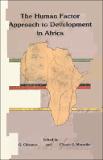| dc.contributor.author | Kambudzi, Admore M. | |
| dc.coverage.spatial | Africa | en |
| dc.date.accessioned | 2016-04-12T13:29:33Z | |
| dc.date.available | 2016-04-12T13:29:33Z | |
| dc.date.issued | 1998 | |
| dc.identifier.citation | Kambudzi, A.M. (1998) The human factor and conflict in post-Cold War Africa. In: Chivaura, V.G. and Mararike, C.G. (eds.) The human factor approach to development in Africa. Harare: UZ Publications, pp. 221-229. | en |
| dc.identifier.isbn | 0908307748 | |
| dc.identifier.uri | https://opendocs.ids.ac.uk/opendocs/handle/20.500.12413/11228 | |
| dc.description | a position paper on how conflict and strife on the continent are signs of human factor decay in Africa. | en |
| dc.description.abstract | The underlying causes of armed conflict in post-Cold War Africa are essentially those of Human Factor (HF) decay Since independence in the 1960s, and throughout the Cold War degraded political conditions such as dictatorship, military rule, corruption, and imported cultures emerged on the continent. Political decay and leadership pathology are, therefore, at the centre of conflict and disorder in Africa. The need to reconstitute a healthy political HF in Africa would, therefore, be top of the agenda to resolve conflict and political tyranny.
And, as far as reconstituting the political HF in Africa is concerned, we can resort to Africa’s own past for models. Africa practised political and economic democracy from lime immemorial and created appropriate conditions for sustaining human life through viable socio-economic and cultural institutions prior to white colonial rule.
In Botswana, for instance, social institutions had reached advanced stages of development by the seventeenth century (National Democratic Institute for International Affairs, 1990: 94). Indigenous political institutions such as the Kgolla (tribal assembly) or dikgosi (royal advisers), had been firmly established and continue to function to this day. These institutions interlocked in such a way that they provided checks and restraints on the power of leaders and safeguarded the freedom and security of members of the community. | en |
| dc.description.sponsorship | International Institute of Human Factor Development. | en |
| dc.language.iso | en | en |
| dc.publisher | University of Zimbabwe (UZ) Publications | en |
| dc.rights.uri | http://creativecommons.org/licenses/by-nc-nd/3.0/ | en |
| dc.subject | Security and Conflict | en |
| dc.title | The human factor and conflict in post-Cold War Africa | en |
| dc.type | Book chapter | en |
| dc.rights.holder | © V. G. Chivaura and C. G. Mararike, University of Zimbabwe, 1998 | en |


